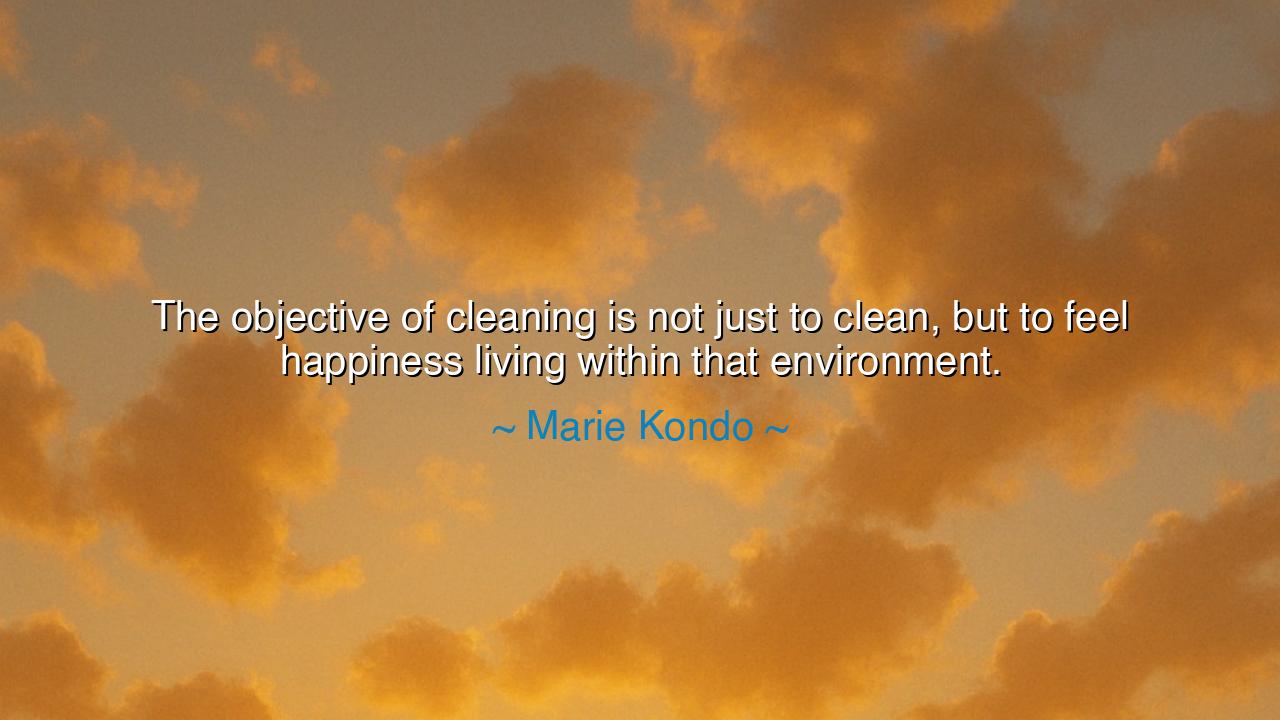
The objective of cleaning is not just to clean, but to feel
The objective of cleaning is not just to clean, but to feel happiness living within that environment.






Marie Kondo, the quiet sage of simplicity and serenity, once wrote: “The objective of cleaning is not just to clean, but to feel happiness living within that environment.” Though spoken softly, these words carry the weight of ancient truth — that the act of cleansing is not a mere task of dust and order, but a spiritual practice, a dialogue between the human heart and the space it inhabits. In this teaching, Kondo reveals that to bring harmony to one’s surroundings is to bring harmony to the soul itself. For in every home, as in every life, there must be balance — a rhythm of letting go, of cherishing, and of making room for joy.
The origin of this quote arises from Kondo’s lifelong study of tidiness as a path toward peace. Her KonMari philosophy was born not of luxury, but of reverence — reverence for things, for space, and for the unseen spirit of order. To her, cleaning is not punishment or duty, but a sacred ritual — a way of aligning the outer world with the inner. In the same way that monks sweep temple floors each morning not merely to remove dust, but to center the mind, Kondo teaches that by clearing our surroundings, we also clear the mental clutter that clouds our joy. She reminds us that the purpose of cleaning is not perfection, but happiness, a happiness that arises from harmony between the self and one’s environment.
To “feel happiness living within that environment” means to create a dwelling that nourishes rather than drains, that welcomes rather than burdens. In ancient Japan, it was believed that every object — a teacup, a book, a broom — carries a spirit, and that disorder in one’s home reflects disorder in one’s heart. The philosopher Lao Tzu might have agreed, for he taught that simplicity is the source of peace. In removing excess, we make space for the flow of life. Clutter is not just physical; it is emotional and spiritual — the accumulation of what no longer serves us. Thus, when we clean, we do not simply move objects; we release stagnation, we restore balance, we breathe life into stillness.
History gives us many mirrors for this wisdom. Consider the Zen monks of Kyoto, who rake the stones of their gardens each dawn, drawing patterns that mirror the movement of water. To the unknowing eye, this may seem an act of futility — for the sand will scatter again. Yet to the monk, the act itself is meditation, a form of communion between hand, heart, and nature. The beauty of the garden lies not only in its design, but in the presence of the one who tends it. Likewise, Marie Kondo’s philosophy tells us that the goal of cleaning is not the fleeting state of tidiness, but the lasting cultivation of presence — to dwell fully in one’s space, awake to gratitude.
There is a deeper teaching here: that our environment is an extension of the soul. The home, like the heart, becomes what we fill it with. If we surround ourselves with disorder, neglect, or things we no longer love, we dull the spirit within us. But when we choose consciously — when we keep only what “sparks joy,” as Kondo so gently says — we practice discernment, the art of valuing what truly matters. This is not the shallow pursuit of aesthetics, but the pursuit of clarity — the kind of clarity that allows peace to dwell where once there was restlessness.
Even the ancients knew this secret. In the temples of Greece and Egypt, priests would cleanse the sacred spaces before any ceremony, believing that purity of place summoned purity of thought. They understood that the divine dwells only where order and intention reside. The same law applies to our lives: when we purify our surroundings, we make them fit for the presence of joy. To clean with mindfulness is to invite happiness to enter — not as a guest, but as a resident.
So, my listener, take this teaching into your own dwelling: clean not to impress, but to renew. When you fold your clothes, do it with gratitude. When you put away what you no longer need, release it with peace. When you clear a space, see it not as emptiness, but as room for new light to enter. For every act of tidying, however small, is an act of love — love for yourself, for your home, and for life itself. And when your environment begins to reflect your heart, you will feel what Marie Kondo spoke of: that happiness is not something found in things, but something that awakens within you, once you make space for it to dwell.






AAdministratorAdministrator
Welcome, honored guests. Please leave a comment, we will respond soon